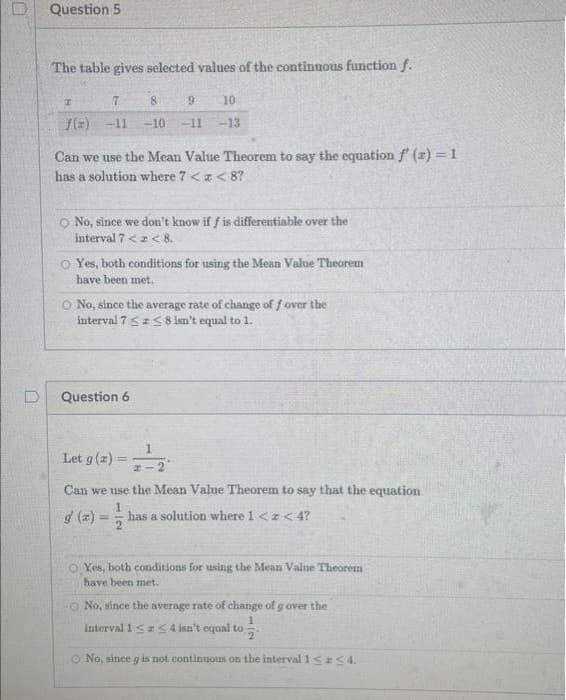D Question 5 D The table gives selected values of the continuous function f. 7 8 9 10 f(z) -11 -10 -11 -13 I Can we use the Mean Value Theorem to say the equation f'(x) = 1 has a solution where 7 << 8? O No, since we don't know if f is differentiable over the interval 7 << 8. O Yes, both conditions for using the Mean Value Theorem have been met. O No, since the average rate of change of f over the interval 75 ≤8 isn't equal to 1. Question 6 Let g (2) = 2-2 Can we use the Mean Value Theorem to say that the equation 1 has a solution where 1 < z < 4? QYes, both conditions for using the Mean Value Theorem have been met. No, since the average rate of change of g over the 1 interval 1 ≤ ≤4 isn't equal to O No, since g is not continuous on the interval 1 ≤ ≤4.
D Question 5 D The table gives selected values of the continuous function f. 7 8 9 10 f(z) -11 -10 -11 -13 I Can we use the Mean Value Theorem to say the equation f'(x) = 1 has a solution where 7 << 8? O No, since we don't know if f is differentiable over the interval 7 << 8. O Yes, both conditions for using the Mean Value Theorem have been met. O No, since the average rate of change of f over the interval 75 ≤8 isn't equal to 1. Question 6 Let g (2) = 2-2 Can we use the Mean Value Theorem to say that the equation 1 has a solution where 1 < z < 4? QYes, both conditions for using the Mean Value Theorem have been met. No, since the average rate of change of g over the 1 interval 1 ≤ ≤4 isn't equal to O No, since g is not continuous on the interval 1 ≤ ≤4.
Algebra & Trigonometry with Analytic Geometry
13th Edition
ISBN:9781133382119
Author:Swokowski
Publisher:Swokowski
Chapter7: Analytic Trigonometry
Section7.3: The Addition And Subtraction Formulas
Problem 76E
Related questions
Question
Fast pls solve this both questions soon I will give u like for sure

Transcribed Image Text:0
D
Question 5
The table gives selected values of the continuous function f.
7
8
9
10
f(z) -11 -10 -11 -13
Can we use the Mean Value Theorem to say the equation f'(x) = 1
has a solution where 7 < x < 8?
O No, since we don't know if f is differentiable over the
interval 7 << 8.
O Yes, both conditions for using the Mean Value Theorem
have been met..
O No, since the average rate of change of f over the
interval 75 ≤ 8 isn't equal to 1.
Question 6
Let g (2) == -2
Can we use the Mean Value Theorem to say that the equation
1
has a solution where 1 < x < 4?
2
Yes, both conditions for using the Mean Value Theorem
have been met.
No, since the average rate of change of g over the
1
interval 1 ≤ ≤ 4 isn't equal to
O No, since g is not continuous on the interval 1 <=<4.
Expert Solution
This question has been solved!
Explore an expertly crafted, step-by-step solution for a thorough understanding of key concepts.
This is a popular solution!
Trending now
This is a popular solution!
Step by step
Solved in 2 steps

Recommended textbooks for you

Algebra & Trigonometry with Analytic Geometry
Algebra
ISBN:
9781133382119
Author:
Swokowski
Publisher:
Cengage


Algebra & Trigonometry with Analytic Geometry
Algebra
ISBN:
9781133382119
Author:
Swokowski
Publisher:
Cengage
